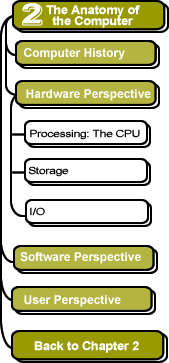

|
How is the CPU able to store and retrieve from the memory system? The CPU does so by making reference to memory addresses. Every spot in memory has a unique address, and this address is a number. These number addresses for memory locations are simply the result of counting the memory locations, starting at zero.
But remember: this counting happens in binary. Thus, any nice, "tidy bundles" of memory will be described in binary numbers, not decimal numbers.
 This
is why memory is purchased in such quantities as 4, 8, 16, 32, 64, 128,
256, 512, 1024, and so on: because these are all powers of 2 and, therefore,
"nice round numbers" in binary.
This
is why memory is purchased in such quantities as 4, 8, 16, 32, 64, 128,
256, 512, 1024, and so on: because these are all powers of 2 and, therefore,
"nice round numbers" in binary.
Let's take a look at some more quantities of memory...
What are all those strange units that are used to specify memory sizes?
Memory sizes vary so much, from the small size of registers to the colossal size of hard drives, that using one unit for all of them is impractical. A system using metric prefixes is standard in the industry, so it is useful to learn the jargon. Take care though, because the prefixes are not the normal multiples of ten, as one might expect, but are binary multiples (powers of two). There are only a few prefixes you need to know:
| Prefix | Abbreviation | Size | Typical use |
|---|---|---|---|
| kilo | K | 210=
1024 (slightly over one thousand) |
register files and cache sizes are typically measured in kilobytes. |
| mega | M | 220
= 1048576 (slightly over one million) |
large caches and main memory are measured in megabytes. |
| giga | G | 230= 1073741824 (slightly over one billion) | Hard drives and DVDs are measured in gigabytes. |
| tera | T | 240 = 1099511627776 (slightly over one trillion) | Large disk clusters can be terabytes in size. |
How many megabytes of memory do you really need in that new computer you want to buy? Computer sellers would really like you to fall for the "grass is always greener" syndrome! Consumerism, the frenzy to buy more and more regardless of need, is often a tempting road for the computer buyer. In purchasing a new computer system, the Biblical principle of stewardship is important. As God's stewards, or caretakers, Christians are called to use the earth's limited resources wisely. That means carefully considering the size and performance you need before purchasing a computer. Computer marketing will try to persuade you to purchase as much as possible, so your true needs must be sifted from the marketing hype. Consider the memory requirements for the software you plan on using. Consider the expandability of the computer system. If you need to add more memory at a future date, is there room to do so? Computers are very difficult to recycle, so expanding an existing system is one way to avoid throwing away those valuable resources. Of course, giving the old computer to someone else is a good way to recycle, but if everyone has the same consumerist, "bigger is better" attitude, no one may want that old system, even though it may still be perfectly adequate for certain tasks.
![]()
![]()
These pages were written by Steven H. VanderLeest and Jeffrey Nyhoff and edited by Nancy Zylstra
©2005 Calvin University (formerly Calvin College), All Rights Reserved
If you encounter technical errors, contact computing@calvin.edu.